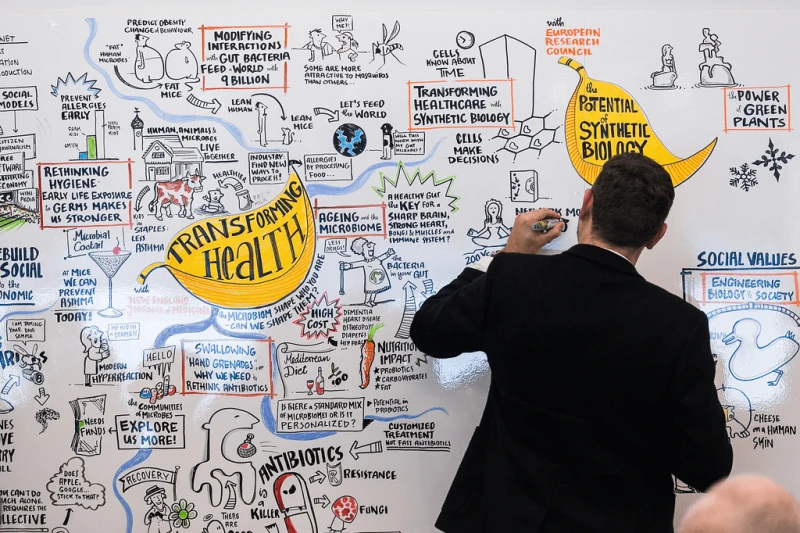Podcast: How synthetic biology can tweak DNA in viruses, plants or even animals to improve the environment, health, agriculture and industrial processes
Podcast: How synthetic biology can tweak DNA in viruses, plants or even animals to improve the environment, health, agriculture and industrial processes


Welcome back to Dirt to Dinner: Digging In, where we dig into what’s going on in the food and ag world. In this episode, we spoke with Ahmed ‘Eddie’ Qureshi about synthetic biology.
Ahmed is currently a founder of Valorant Health, which provides virtual care resources to over 67 million Americans living in rural and underserved areas. Ahmed started in Synthetic Biology wanting to apply its promise of scaling and iterating for maximum impact in healthcare. He was also a co-founder at DNAWorks, a spinout of the University of Washington’s Molecular Engineering and Sciences department. You can read more about Ahmed here.
Scientists utilizing synthetic biology can change the DNA in viruses, bacteria, yeasts, plants, or even animals to improve human health, the environment, agriculture, and industrial processes. For instance, it is being used to reduce fertilizer usage on crops, enhance milk protein fermentation for use in non-dairy products, to create a plant-based coating to extend the shelf life of produce, and even to turn mushrooms into leather.
In our conversation with Ahmed, we talk about the definition of synthetic biology, as well as the impact artificial intelligence will have on re-designing living organisms into new products.
This is an excerpt. See the original post here

 | Videos | More... |

Video: Nuclear energy will destroy us? Global warming is an existential threat? Chemicals are massacring bees? Donate to the Green Industrial Complex!
 | Bees & Pollinators | More... |

GLP podcast: Science journalism is a mess. Here’s how to fix it

Mosquito massacre: Can we safely tackle malaria with a CRISPR gene drive?

Are we facing an ‘Insect Apocalypse’ caused by ‘intensive, industrial’ farming and agricultural chemicals? The media say yes; Science says ‘no’
 | Infographics | More... |

Infographic: Global regulatory and health research agencies on whether glyphosate causes cancer
 | GMO FAQs | More... |

Why is there controversy over GMO foods but not GMO drugs?

How are GMOs labeled around the world?

How does genetic engineering differ from conventional breeding?
 | GLP Profiles | More... |

Alex Jones: Right-wing conspiracy theorist stokes fear of GMOs, pesticides to sell ‘health supplements’




 Viewpoint — Fact checking MAHA mythmakers: How wellness influencers and RFK, Jr. undermine American science and health
Viewpoint — Fact checking MAHA mythmakers: How wellness influencers and RFK, Jr. undermine American science and health Viewpoint: Video — Big Solar is gobbling up productive agricultural land and hurting farmers yet providing little energy or sustainabilty gains
Viewpoint: Video — Big Solar is gobbling up productive agricultural land and hurting farmers yet providing little energy or sustainabilty gains Fighting deforestation with CO2: Biotechnology breakthrough creates sustainable palm oil alternative for cosmetics
Fighting deforestation with CO2: Biotechnology breakthrough creates sustainable palm oil alternative for cosmetics Trust issues: What happens when therapists use ChatGPT?
Trust issues: What happens when therapists use ChatGPT? 30-year-old tomato line shows genetic resistance to devastating virus
30-year-old tomato line shows genetic resistance to devastating virus California, Washington, Oregon forge immunization alliance to safeguard vaccine access against federal undermining
California, Washington, Oregon forge immunization alliance to safeguard vaccine access against federal undermining The free-range chicken dilemma: Better for birds, but with substantial costs
The free-range chicken dilemma: Better for birds, but with substantial costs ‘You have to treat the brain first’: Rethinking chronic pain with Sanjay Gupta
‘You have to treat the brain first’: Rethinking chronic pain with Sanjay Gupta
